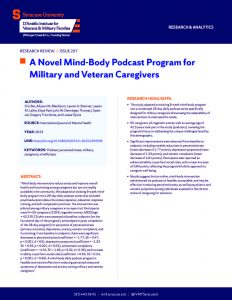Abstract:
“Mind-body interventions reduce stress and improve overall health and functioning among caregivers but are not readily available in the community. We adapted an existing 8-week mind-body program into a 28-day daily podcast series that included psychoeducation about the stress response, relaxation-response training, and self-compassion practices. The intervention was piloted among military caregivers in an open trial. Participants were N = 55 caregivers (100% cisgender women, M(SD)age
= 42.3 (9.1)) who were assessed at baseline, midpoint (on the fourteenth day of the program), and endpoint (upon completion of the 28-day program) for symptoms of perceived stress (primary outcome), depression, anxiety, somatic complaints, and functioning. From baseline to endpoint, there were significant decreases in perceived stress (coefficient = −1.77, SE = 0.47, p < 0.001, d = 0.5), depressive symptoms (coefficient = −1.33 SE = 0.39, p < 0.001, d = 0.53), and somatic complaints
(coefficient = −4.01, SE = 1.66, p = 0.02, d = 0.36); and increase in ability to perform social roles (coefficient = 0.84, SE = 0.24, p < 0.001, d = 0.46). A mind-body daily podcast program is feasible and may be effective in reducing perceived stress and symptoms of depression and anxiety among military and veteran caregivers.”
Research Highlights:
- This study adapted an existing 8-week mind-body program into a condensed 28-day daily podcast series specifically designed for military caregivers showcasing the adaptability of interventions to meet specific needs.
- 55 caregivers, all cisgender women with an average age of 42.3 years took part in the study (podcasts), revealing the program’s focus on addressing the unique challenges faced by this demographic.
- Significant improvements were observed from baseline to endpoint, including notable reductions in perceived stress (mean decrease of 1.77 points), depressive symptoms (mean decrease of 1.33 points), and somatic complaints (mean decrease of 4.01 points). Participants also reported an enhanced ability to perform social roles, with a mean increase of 0.84 points, reflecting the program’s holistic approach to caregiver well-being.
- Results suggest that an online, mind-body intervention administered via podcasts is feasible, acceptable, and may be effective in reducing perceived stress, as well as psychiatric and somatic symptoms among individuals exposed to the chronic stress of caregiving for someone.

